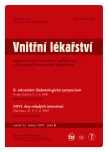Development of opinions on physical exercise for diabetics
Authors:
J. Rybka
Authors‘ workplace:
Diabetologické centrum Interní kliniky IPVZ, přednosta prim. MUDr. Ivo Oral, CSc., WHO-CC, Krajská nemocnice T. Bati a. s., Zlín, vedoucí prof. MUDr. Jaroslav Rybka, DrSc.
Published in:
Vnitř Lék 2007; 53(5): 537-539
Category:
Předneseno na 8. celostátním diabetologickém symposiu „Diabetes a další obory II (smyslové ústrojí a pohybová aktivita)“ ve dnech 2. - 3. června 2006 v Novém Adalbertinu v Hradci Králové
Overview
Physical activity is an integral part of treatment for type 1 diabetes mellitus (DM1T) and type 2 diabetes mellitus (DM2T). A programme of regular physical activity adapted to the complications in effect is recommended for all diabetics. Diabetes mellitus has become a problem and an entirely distinct illness for modern cardiology, especially because of the exceptional development of accelerated atherosclerosis. Long term training brings has long term positive effects on blood sugar and insulin sensitivity. There is no doubt that physical activity plays a key role in the regulation of body weight and the reduction in fat deposits for diabetics, with entirely positive results in therapy and the prevention of metabolic syndrome, manifestation of diabetes and reduction of metabolic and cardiovascular risk in diabetic patients. Although physical activity has an extraordinarily positive effect on a diabetic's organism, there are also risks that the patient should be made aware of. There is a risk during acute exertion, especially for patients undergoing medication therapy. The possible complications that may be caused by physical exertion should be avoided by suitable patient education. There are increasing levels of strong evidence that regular physical activity contributes to primary and secondary prevention of metabolic syndrome, diabetes, especially type 2 diabetes and obesity and is associated with a reduced risk of early death. It has been shown that physical activity improves body composition. In summary it can be said that only regular physical exertion that is determined individually and set precisely in terms of both quantity and quality can achieve the therapeutic objective for the taught patient. Physical activity programmes should be designed for all age groups of diabetics because the risk of chronic illness for diabetics, especially cardiovascular illness, increases with age.
Key words:
physical activity – diabetes mellitus – atherosclerosis – oxidation stress – metabolic syndrome – cardiovascular diseases – obesity
Sources
1. Boulé NG, Kenny GP, Haddad E et al. Meta-analysis of the effect of structured exercise training on cardiorespiratory fittness in type 2 diabetes mellitus. Diabetologia 2003; 46 : 1071-1081.
2. Cusi KJ, Pratipanawatr T, Koval J et al. Exercise increases hexokinase II mRNA, but not activity in obesity and type 2 diabetes. Metabolism 2001; 50 : 602-606.
3. DeFilippis EA, Cusi K, Fernandez M et al. Exersice improves endothelial function in type 2 diabetes. Diabetes 2004; 53: A8.
4. Doležalová R, Haluzík M Metabolický syndrom a fyzická aktivita. In: Svačina Š (Ed) Trendy soudobé diabetologie, sv. 10, Galén 2005, 95-117.
5. Christ-Roberts CY, Pratipanawatr T, Pratipanawatr W et al. Exercise training increases glycogen synthase activity and GLUT4 expression but not insulin signaling in overweight nondiabetic and type 2 diabetic subjects. Metabolism 2004; 53 : 1233-1242.
6. Koval JA, DeFronzo RA, O´Doherty RM et al. Regulation of hexokinase II activity and expression in human muscle by moderate exercise. Am J Physiol 1998; 274: E304-E308.
7. Musi N, Goodyear LJ AMP-activated protein kinase and muscle glucose uptake. Acta Physiol Scand 2003; 178 : 337-345.
8. Rybka J Diabetes a fyzická aktivita. In: Perušičová JH (Ed). Trendy soudobé diabetologie, sv. 4, Galén 2000, 31-58.
9. Rybka J. Fyzická aktivita (zátěž) - jeden z pilířů prevence a terapie diabetes mellitus. Interní medicína 2005; 7 : 135-138.
10. Yamauchi T, Kamon J, Minokoshi Y et al. Adiponectin stimulates glucose utilization and fatty-acid oxidation by activating AMP-activated protein kinase. Nat Med 2002; 8 : 1288-1295.
Labels
Diabetology Endocrinology Internal medicineArticle was published in
Internal Medicine

2007 Issue 5
Most read in this issue
- Inflammatory diseases of the eye
- Tinnitus and diabetes
- Increased activity of the sympathetic nervous system and the possibilities for therapeutic influence
- Olfaction and gustation in diabetes
